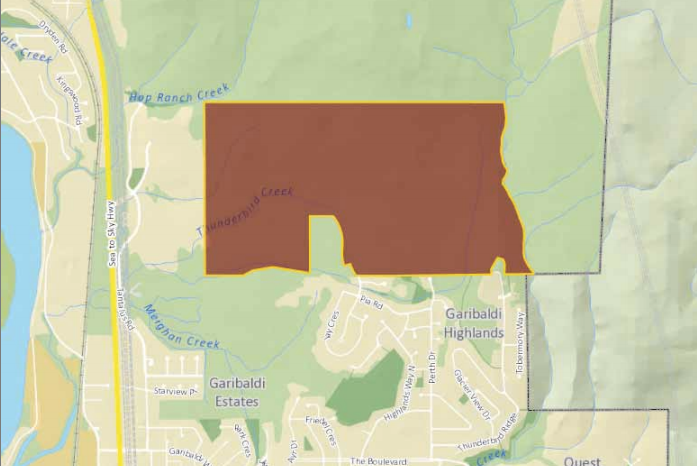If this were a game of chess it would be the landowners’ move.
The Cheema family, owners of one of the largest areas of privately owned, undeveloped land in Squamish has said they will not allow recreationalists to cross through their 400-acres of property until Squamish council allows them to develop.
Popular mountain biking and running trails traverse the Cheema land that connects the upper Highlands with Alice Lake Park trails.
It may be some time, however, before council makes any definitive decisions about the land.
Council passed a motion Tuesday to refer the issue to the growth management meeting of the Official Community Plan review scheduled for next month.
Blocking access to the trails on the property could impact major upcoming sporting events in Squamish including the Spakwus 50 Marathon Mountain Bike Race, the Squamish Triathlon and the BC Bike Race.
The current OCP, adopted in 2010, restricts development on the Cheema properties, known officially as District Lots 509 and 510, until the community reaches a population of 22,500. The latest census has Squamish’s population at 19,893.
The issue came before council on Tuesday night through a motion by Coun. Susan Chapelle to consider dropping the cap from the Official Community Plan.
“What I wanted addressed was that we make sure that if we are going to have policy that is addressing sprawl or development of green space… that it be done fairly and comprehensively and not by picking single properties,” Chapelle said.
Mayor Patricia Heintzman said the issue of growth management, including the Cheema land and population caps, was set to come up in mid-April anyway as part of the current review of the Official Community Plan.
Heintzman told The Chief that municipalities use population caps to restrict development in order to protect the environment and because it is expensive for cities to put in infrastructure and servicing into undeveloped areas.
Development growth has to have the tax base to support it, Heintzman added. She said she welcomes the public and council discussions around what should happen with the Cheema land.
“It is worthy of a lot of discussion because it is a whole discussion about urban sprawl and greenfield development and there’s a big philosophical discussion about how we do these things? Is it a population cap, is it urban boundaries. Is it a more concise phased approach to different areas?”
The draft of the OCP won’t likely be complete until May or June, Heintzman said, then it will go out to the public for further feedback before a final version is completed.
Bob Cheema, who spoke to The Chief on behalf of the family, said if council removes the cap, originally put in place in the 1990s, and allows development on his land, the family will invest up to $1 million on improving the existing trails.
If not, the trails will be closed.
“There’s going to be fencing and security people and cameras that we need to put in,” he said told The Chief prior to Tuesday’s council meeting.
Cheema said the family has allowed access across their property for 12 years, but he feels he has no choice but to close the trails for safety reasons.
The issue is about liability if someone is hurt, not about holding his lands hostage until he gets his way, Cheema asserted.
“We have concern as the primary land holder. We had concern from our insurance people too because it is not safe,” he said.
Though details of what Cheema envisions in terms of development on the land aren’t fully worked out, he said the idea is for mixed-use development that will roll out in phases.
The Squamish Off-road Cycling Association leadership backed Cheema’s request to drop the population cap in a letter to council.
“Losing access to their trails and the connectivity these trails provide to lands beyond would be catastrophic,” said Jeff Cooke, president of SORCA.
Cooke added that loss of the trails would impact not only local riders and race events that utilize the trails but “the economic engine that is our mountain bike tourism industry.”
Given the scheduled pace of the OCP review it is unlikely that the issue of the Cheema land will be resolved in time for several of the annual athletic events planned for this summer; The Spakwus 50 is planned for June 17 and the annual Squamish Triathlon is scheduled for July 16, for example.
Councillors Jason Blackman-Wulff and Doug Race warned that should Cheema close the trails to the public, that move would be taken into consideration when zoning applications for the properties are brought to council.
“I understand it is private property, but the reality is people have been crossing that property on bikes, on foot, running, with their dogs and so forth for decades,” Race said. “So to try and sort of gain some advantage through city hall by blocking that off, I can tell you it is something I will consider on a future decision.”



